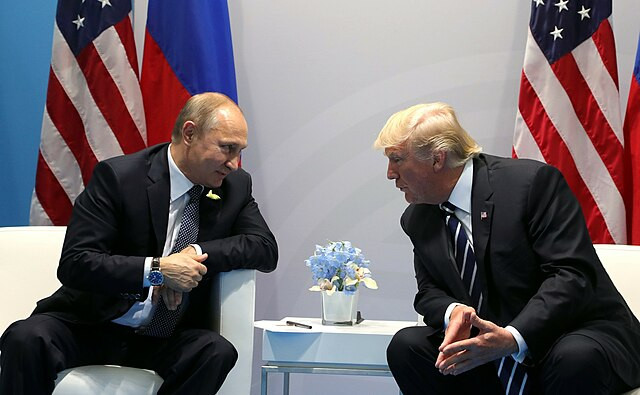Senior U.S. and Russian officials convened in Riyadh on Tuesday for discussions aimed at negotiating an end to the war in Ukraine, a diplomatic move that has sparked alarm among European allies and Kyiv. The meeting, hosted by Saudi Arabia, follows a direct phone call last week between President Donald Trump and Russian President Vladimir Putin, in which both leaders agreed to explore a potential settlement.
Leading the U.S. delegation was Secretary of State Marco Rubio, accompanied by National Security Adviser Mike Waltz and White House special envoy Steve Witkoff. Russian Foreign Minister Sergey Lavrov headed Moscow's team. Kremlin adviser Yuri Ushakov, speaking after the four-and-a-half-hour meeting, described the discussions as "very serious" and said both sides recognized the importance of improving relations. "It was a very serious discussion on all questions that we wanted to touch on," Ushakov told reporters.
The exclusion of Ukraine from the talks has intensified concerns in Kyiv, where President Volodymyr Zelenskyy has warned that any settlement reached without Ukrainian involvement would be unacceptable. "Ukraine did not know anything about it," Zelenskyy said ahead of the meeting, adding, "We cannot recognize ... any agreements about us without us." European leaders have also expressed unease, with Danish Prime Minister Mette Frederiksen cautioning that Russia could use the pause in hostilities to strengthen its military position for future aggression. "Russia is threatening all of Europe now, unfortunately," Frederiksen said.
While U.S. officials have characterized the talks as preliminary, the negotiations reflect a dramatic shift in Washington's approach to Moscow under Trump's leadership. During the Biden administration, U.S. policy was firmly aligned with European allies in supporting Ukraine's territorial integrity and military resistance against Russian forces. Trump, however, has signaled that he is open to discussions involving territorial concessions by Kyiv and the abandonment of Ukraine's NATO ambitions-both key Russian demands.
Ahead of the meeting, Lavrov made it clear that Russia would not entertain any proposals requiring it to return annexed Ukrainian territories. "They say we should probably give territorial concessions - but what for?" Lavrov stated, referencing unverified claims that ethnic Russians in occupied areas face persecution from Ukrainian forces.
The talks come at a time when Russian troops have made battlefield advances, strengthening Moscow's negotiating position. While the Biden administration previously dismissed Russian overtures as efforts to buy time for further military gains, Trump's administration appears more willing to engage. State Department spokesperson Tammy Bruce described the U.S. delegation's objective as determining "if the Russians perhaps are serious, and if they're on the same page."
The meeting also coincides with diplomatic maneuvering between Moscow and Washington on unrelated matters. On Monday, Russian authorities approved the release of an American detained at a Moscow airport for possession of cannabis-an incident that under previous administrations could have resulted in a lengthy prison sentence. The release follows a pattern of negotiations over detained Americans, including past cases such as Brittney Griner and schoolteacher Mark Fogel, both of whom were jailed in Russia and later freed in prisoner exchanges.
In a further sign of deepening engagement, Russian officials have indicated that Trump may visit Moscow in the near future, possibly joining Putin for Russia's May celebrations marking the 80th anniversary of the Soviet victory in World War II. The prospect of such a visit has fueled speculation about Trump's broader strategy in reshaping U.S.-Russia relations.
The negotiations in Riyadh have also drawn sharp criticism from U.S. lawmakers and former officials. Critics argue that Trump's direct engagement with Putin on the Ukraine issue weakens Kyiv's leverage and risks legitimizing Russia's land grabs.
Meanwhile, on the ground in Ukraine, residents expressed growing concern over being sidelined in negotiations. In Kherson, a strategically significant city under persistent Russian shelling, civilians voiced skepticism about the talks. "It's confusing. It's going quickly, and we don't see where it's going," said Yulia Ishuk, who has been working to rehabilitate wounded Ukrainian soldiers. "Without our president, Zelenskyy ... it's kind of like games behind our backs, and we don't like it."
As U.S. and Russian officials continue their discussions, European leaders are scrambling to formulate a response. French President Emmanuel Macron convened an emergency meeting with European Union officials and British leaders to assess the implications of the U.S.-Russia dialogue. "We seek a strong and lasting peace in Ukraine," Macron said in a statement. "To achieve this, Russia must end its aggression, and this must be accompanied by strong and credible security guarantees for the Ukrainians."




